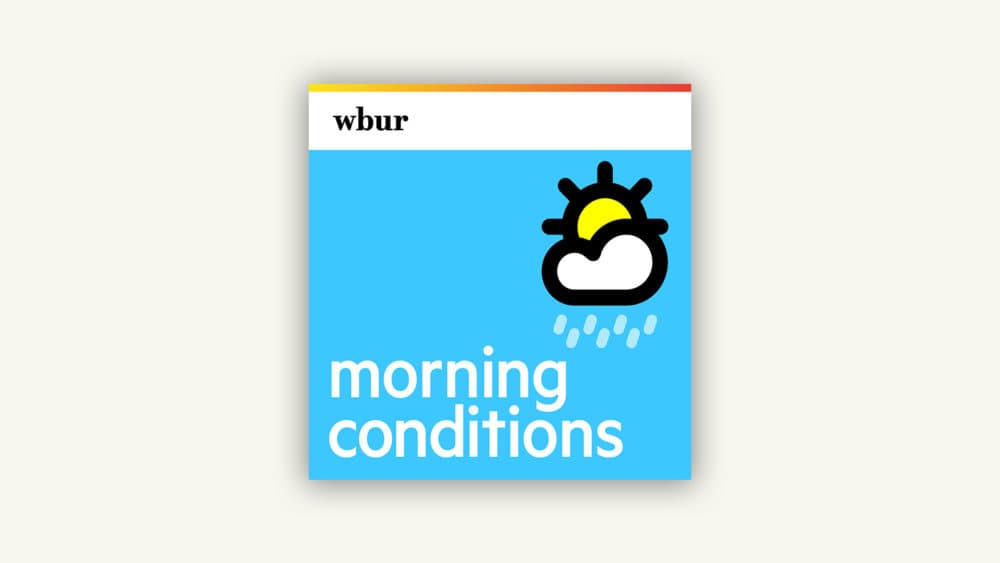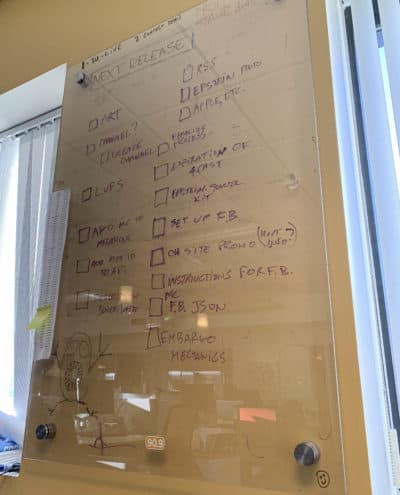Advertisement
What We Learned Making Our First Microcast: 'Morning Conditions'

Late last year, WBUR launched its first-ever microcast.
What's a microcast? Well, it's a term that's still being defined. But at Project CITRUS we describe it as a shorter, newsier, timelier, more ephemeral podcast. A microcast is less art and more commodity; less storytelling and more a recitation of facts. They often clock in at less than two minutes. They are digital-first (as opposed to broadcast-first), and often digital-only. And they make for excellent flash briefings.
For our first experiment, we tapped meteorologist David Epstein, who already records tiny weather updates for broadcast on WBUR. What if, we thought, he also did a longer (one- to two-minute) forecast that is self-contained, less rushed, more informational and digitally distributable?
Why A Microcast?
New platforms demand different audio. In particular, quick, single-topic news updates are a natural fit for smart speakers. And microcasts mesh perfectly with Alexa's user-customizable flash briefings.
A major goal of Project CITRUS is to pilot new digital-first content. In particular, we want to test out various processes — recording, uploading, transcoding, distribution, marketing — and, thus, estimate the potential added workload. At the same time, Epstein had been lobbying for a weather podcast for some time. So this seemed like serendipity.
Why Weather?
Weather affects everyone, and forecasts provide nuts-and-bolts information to deal with weather. They're habit-forming. They're popular. And a morning weather forecast is a natural fit for short-form audio: It packs useful, practical information into an easily digestible segment.
The advice sprinkled into each forecast translates well to a smart speaker. One appeal of smart assistants like Alexa is that they have the potential to sound like smart assistants — virtual butlers, if you will — and useful insight or fun tips, alongside the temperatures and snowfall amounts, help shape that experience. Barometer readings and wind speeds have their use, but boil it down for me: Do I need an umbrella? Should I hit the beach?
Morning Conditions also achieves all the goals laid out within the CITRUS acronym:
- Creating: We're making something new! (And not simply repackaging broadcast-first material.)
- Independent: Packaged with a quick intro and outro, the microcast is self-contained and needs no context (as compared to the shorter, for-broadcast weather clips we create, which require an intro from a host).
- Thoughtful: We bring public-radio smarts and sensibility to the daily forecast.
- Reusable: Morning Conditions simply works, regardless of the listening platform. Sure, we initially targeted smart speakers, but the audio certainly doesn't sound out of place as part of an Overcast playlist, next to some morning news podcasts.
- Unique: It stands out against the competition, like the Matt Noyes flash briefing and "Boston.com Weather."
- Segments: It's a short, newsy and lightly produced piece of audio.
A Well-Known Host
Epstein is an established, trusted meteorologist — who can be found not just on WBUR's air, but also on a number of Boston media outlets. That pre-existing relationship meant we didn't need to introduce listeners to a new voice, nor did we need to create a new audio workflow.
While production and distribution of the microcast initially created some challenges for our team, Epstein's recording routine scarcely changed. Morning Conditions is simply one more .wav file on his daily to-do list.
In The Routine
WBUR smart-speaker listeners are generally morning people. Ergo, we posited a morning weather forecast would be something useful for them to listen to as they prepare for the day. In addition, a brief, daily forecast is one of the most common smart-speaker requests.

Deployment
Deploying audio files at WBUR is, in most cases, a fairly straightforward process: An audio tech leaves a raw .wav file on a shared drive and, through a variety of automated processes, that file becomes an MP3 which can be found on a dedicated web page, our mobile app and in the appropriate RSS feed. All this magic, however, is predicated on a usually fair assumption: that a post which corresponds to the audio has been created in our content management system.
Alas, building out a dedicated page for each Morning Conditions file would be silly — no one is clamoring for an archive of last year's forecasts — as well a lot of additional work. So, to make this work, we had to make a number of tweaks to various helper scripts and APIs.
But once we had post-less audio files working, it was all downhill. A friend of the station created a simple-but-slick Morning Conditions logo. We then created a flash briefing that was approved by Amazon soon thereafter. (Because we had done this once before, creating the proper Alexa-specific JSON for Morning Conditions was a breeze.)
Finally, we notified every major podcast distributor and podcatcher: Google, Apple, Spotify, TuneIn, Acast, Overcast, RadioPublic, NPR One, Castro, Pocket Casts, etc. (Though this particular part was time-consuming, and not as smooth as hoped. We hope to streamline it for future microcasts.)
How Are We Marketing It?
Morning Conditions has had an extremely soft launch. WBUR hasn't yet done a formal push via its usual channels (on-air messaging, web ads, social, etc.) but we anticipate doing so later this year.
Any promotion has been totally organic and unplanned. In fact, our most effective spokesperson has been our host. Epstein's tweets to his 40,000+ followers always correlate to an impressive spike in downloads.
Epstein tweets all on his own; we don't make suggestions about copy or timing. That has helped bolster the grassroots feel of the project, especially when it comes to asking for user feedback.
Designing A Splash Page
Every podcast needs a web presence, or at least a landing page with show details and ways to listen. Morning Conditions presented some unique challenges here, both because it's our first microcast and because it doesn't have any accompanying web articles (thus, no shareable permalinks for each forecast).
Given Morning Conditions' smart-speaker focus, it was imperative that we provide clear installation instructions. The microcast was initially designed to work as an Alexa flash briefing — but flash briefings can be tricky to set up, and difficult to discover and promote (we hope this will change in the future). Simple, understandable guidance is critical to having any kind of meaningful adoption.
In the end, we built this page, which boasts some useful features:
- An inline audio player that's dynamically updated with the latest forecast
- Step-by-step instructions for accessing the forecast via smart speaker
- A promotional inset with direct links to various podcast platforms
It's a tidy one-stop shop, perfect for quick promotions on Twitter and Facebook. It also provides a great template for future microcasts.
Another Promotional Lever? The Actual Weather
Luckily, we were able to launch just before the most dreaded season in Boston: winter. As the snow moves in and space savers emerge, people will seek out solid and reliable weather sources — like Morning Conditions. And as big storms approach, social media posts from meteorologists tend to go viral.
Added Touches
Epstein takes real advantage of the intimacy of audio. Unlike a typical news story, Morning Conditions will casually slip out of the third person ("We made it to the weekend," "You might want to salt your steps"). This translates especially well on smart speakers: It's like having your own weather forecaster in your kitchen or living room. It feels personal — and perhaps even a tad futuristic.
Morning Conditions is also consistent and reliable. It always clocks in at 60-90 seconds and has a predictable intro and outro, which is helpful for the user and makes things sound less jarring. It's also available within a set timeframe each day.
What's To Come?
- Broader marketing: As we mentioned before, we plan to do more widespread and formal promotion.
- SEO, but for audio: How do we improve the discoverability of these microcasts? Optimizing for search engines is nothing new for us. But how does one boost rankings in, say, the Alexa flash briefing directory? We hope to report back on this.
- "Weekend Cast": We're thinking about creating one additional forecast that covers both Saturday and Sunday. That way, we can boast about having seven-days-a-week coverage.
- Deeper into smart speakers: We've been brainstorming about incorporating the forecast into a larger WBUR Alexa skill. Or perhaps moving it into its own skill and creating a more AI-like, interactive experience ("David, tell me again: What's a cold front?").
- More and more microcasts: Morning Conditions is just the tip of the iceberg! And by taking on the most nuanced and complicated microcast first, the ensuing ones should seem much easier.

